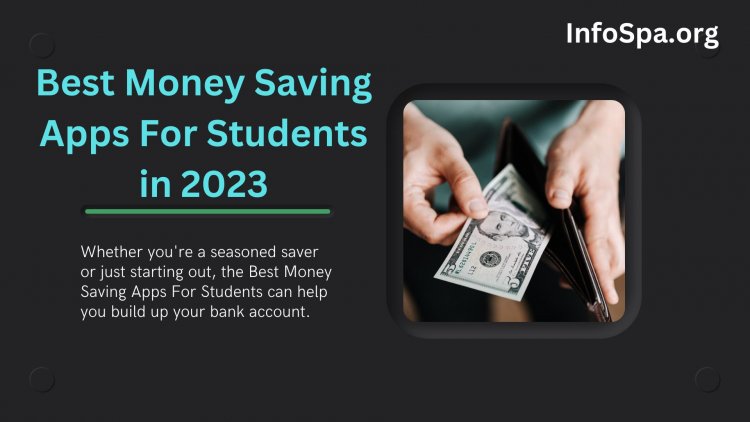Best Money Saving Apps For Students in 2023 - InfoSpa
Best Money Saving Apps For Students in 2023: Whether you're a seasoned saver or just starting out, the Best Money Saving Apps For Students can help you build up your bank account.

Whether you're a seasoned saver or just starting out, the Best Money Saving Apps For Students can help you build up your bank account. Each app provides its own set of tools and strategies to assist you in saving, and all you need is a checking account and a smartphone. These apps are intended to inspire you to get into the habit of saving without overthinking it, in addition to their practical benefits.
Keep in mind that you'll need to share your bank data with a Money Saving Apps For Students (unless the app is provided directly by your bank), so read the terms and conditions carefully. Best Money Saving Apps For Students in 2023
Also Read: How To Earn Money From Facebook Page Likes – INFOSPA
1. Digit
Digit is an automated savings app that analyses what goes in and out of your checking account. The funds are then transferred from checking to savings on a regular basis in amounts determined by its algorithms to be safe to save.
Digit is a good choice for people who identify as spenders rather than savers and prefer to delegate decisions.
Digit charges $5 per month after a 30-day free trial. For that fee, you'll get the auto-savings feature as well as the ability to use the app to pay off credit card debt and set savings goals. You can earn a 0.1 percent annual savings bonus that Digit pays every three months, which can help offset some of the subscription fee.
If Digit determines that you are unable to save money, it will not withdraw any funds until you are in a better position to save. Digit will refund up to two overdrafts if they happen by accident. You can also opt in for overdraft prevention.
It will take one to three business days to transfer money back into your checking account. If you require the funds immediately, you can pay 99 cents to have them deposited into your checking account within 30 minutes.
Your funds are kept in FDIC-insured banks, so you are insured up to $250,000.
Digit was acquired by fintech company Oportun in 2021, and the app's name will be changed to Oportun in the future.
- Best for: Outsourcing savings decisions
- Cost: Free for 30 days, then $5 per month
2. Qapital
Qapital also aims to help you save small amounts of money easily, but with a twist: it allows users to set up savings rules. For example, you could set up a guilty pleasure rule so that the app deposits money into your savings account every time you order takeout. Qapital, like some investment apps, can round up your change on purchases and apply it to your savings. If you use a debit card to buy a $4.50 latte, the app takes 50 cents from your checking account and transfers it to your savings. You can also create a rule to increase the size of the roundups.
The app is frequently praised for its visually goal-oriented approach. You can attach photos to your goals, making the portal a digital vision board for your money.
You have several options for using the app: You can link an existing checking account or open a Qapital Spending account, which includes a debit card. You can also open a Qapital Goals savings account as well as a Qapital Invest account. The products you receive are determined by the plan you select.
- Best for: Those who are motivated by visualizing their desired outcomes
- Cost: The basic plan is $3 per month, with additional tiered plans available. A 30-day free trial is available.
Also Read: Old Indian Currency Selling Market Online 2023
3. Long Game
Long Game aims to redirect some of the money that people would have spent on lottery tickets to savings. Users can sign up for partner banks through the app and earn cash prizes for saving money. To achieve their goals, users can earn coins by playing games and completing savings missions. You can also use the app to set personalized financial goals and get money-saving advice.
Truist Financial Corp. purchased the Long Game app in 2022, stating that it planned to use it to help customers build long-term financial wellness.
- Best for: A game-like experience
- Cost: Free
4. Chime
Chime, a digital-only brand, has amassed millions of customers since its inception in 2014. It provides bank accounts with various auto-savings features.
If you set up direct deposit to your Chime account, you can also have Chime move a percentage of your paycheck into your savings. A round-up option is also available to increase savings. The Chime savings account offers an annual percentage yield (APY) that is significantly higher than the national average.
Chime, like other challenger banks, does not hold your bank deposits because it is not a bank. Customer funds are held by FDIC-insured partner banks The Bancorp Bank and Stride Bank.
The Chime app has received high ratings on Google Play and the App Store. It allows you to receive daily account balance notifications in addition to setting up automated savings rules.
- Best for: Those who want their bank app to save their spare change
- Cost: Free
Also Read: Best VoIP Services: VoIP Business Phone Provider
5. Current
Current is a fintech company that provides financial health tools via a mobile banking app. Customers can set up savings goals (dubbed "pods") to automatically set money aside for specific purposes such as a rainy day fund or a vacation. You can also transfer funds directly to your savings pods.
On balances of up to $2,000 per pod, money deposited into savings pods earns a highly competitive rate. Choice Financial Group, an FDIC-insured bank, provides banking services.
Users can also use the app to buy and sell cryptocurrency without incurring any transaction fees.
- Best for: Young adults seeking a banking alternative
- Cost: Free basic checking account
6. Acorns
If you already have some emergency savings and are willing to take some risk, you could consider investing. Acorns is a popular app for putting your spare change into an investment account.
When you connect a debit or credit card to the fintech app, Acorns will round up your purchases to the nearest dollar and invest the difference in a diversified investment portfolio based on your goals. A recurring transfer into Acorns is also possible.
Acorns also provide a retirement investment account and a checking account that is FDIC-insured.
- Best for: Novice investors
- Cost: Starts at $3 per month
Also Read: How to Make Money Online for Beginners Step-By-Step
7. Mint
Mint organizes and monitors all of your accounts in one location. You can link all of your bank and credit card accounts, as well as any loans and investments you may have.
With Mint's program, you can see your entire financial picture, giving you a better understanding of how to manage your finances. You can also set up special notifications to ensure that you never miss a bill and keep track of any subscriptions you may have. You can even be notified if the cost of any of your regular subscriptions rises.
You can track and improve overall spending and debt by creating custom budgets. It is also free because it is funded by partners rather than advertising.
- Best for: Financial newcomers
- Cost: Free
8. You Need a Budget
You Need a Budget (YNAB) lets you create a budget and track your spending. The way it works is that you allocate the money in your bank account to different budget categories. Setting your savings goals in this manner will help you stick to your budget. Every dollar in your account is tracked and assigned a purpose.
You can only assign categories to dollars that are already in your bank account using the app. You'll be able to assign jobs to the new dollars on your next payday.
The app allows you to link external accounts, credit cards, and loans so that they are automatically included in your budget. Those who do not want to link external accounts can manually enter balance information.
According to YNAB, those who start using it save an average of $600 in the first two months and more than $6,000 in the first year.
- Best for: Those who prefer a hands-on budgeting approach
- Cost: Free for 30 days, then $14.99 paid monthly or $99 paid annually
Are Money Saving Apps Safe?

Fintech companies use a variety of security measures to safeguard your information. The safety of an app will differ depending on the company. So, go over the terms and conditions to see if you're comfortable with how the company is handling your financial data. Best Money Saving Apps For Students in 2023
Also Read: How to Make Money From Home as a Woman
Why You Should Use a Money Saving App
If you have a habit of spending before saving, these apps can help you change your habits. They're also an excellent choice if you're just getting started with your savings. Rather than requesting a large lump sum, as some traditional savings accounts do, these apps move small amounts of money into your savings on a regular basis, making the task easier. Best Money Saving Apps For Students in 2023
After you've saved some money, you should consider putting it in a high-yield savings account. Yields can vary significantly between banks, so it pays to shop around. Online banks frequently offer lower interest rates than traditional banks. If you don't need to access your savings for a while, consider investing in a certificate of deposit.

























